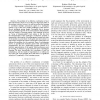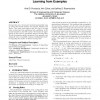183 search results - page 29 / 37 » Learning Social Preferences in Games |
124
click to vote
HRI
2010
ACM
15 years 6 months ago
2010
ACM
— Assisting humans in their daily lives requires robots to be proficient in manual tasks and effective in communicating states/intentions with human users. This paper advocates ...
101
click to vote
ICRA
2007
IEEE
15 years 8 months ago
2007
IEEE
Abstract— The problem of an effective coordination of multiple autonomous robots is one of the most important tasks of the modern robotics. In turn, it is well known that the lea...
CHI
2009
ACM
16 years 2 months ago
2009
ACM
We conducted a 2.5 week longitudinal study with five motor impaired (MI) and four non-impaired (NMI) participants, in which they learned to use the Vocal Joystick, a voice-based u...
139
click to vote
SAGT
2010
Springer
15 years 9 days ago
2010
Springer
The PPAD-completeness of Nash equilibrium computation is taken as evidence that the problem is computationally hard in the worst case. This evidence is necessarily rather weak, in ...
102
click to vote
ATAL
2008
Springer
15 years 3 months ago
2008
Springer
Scoring rules are a broad and concisely-representable class of voting rules which includes, for example, Plurality and Borda. Our main result asserts that the class of scoring rul...


